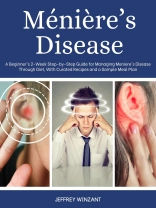Around 45, 500 people in the United States are diagnosed with Ménière’s disease each year. 12 out of 1000 people are affected by the condition. If you think you are one of them, keep reading to find out how to treat Ménière’s with your nutrition.
While it is a chronic disease, it is possible to treat it through a proper diet. However, it is crucial to get diagnosed by a doctor. A diagnosis can depend on several variables, such as two or more episodes of vertigo and a hearing test to determine the extent of loss of hearing.
Based on scientific studies, 6 out of 10 people can control their disease by changing their diet. Controlling the fluid in the inner ear with your diet can help control the symptoms. It involves eating regularly to manage the fluids in your body. As well as avoiding certain things like alcohol, chocolate, and caffeine that can worsen your headaches.
However, the most important part is keeping to a low sodium diet as sodium causes fluid retention and can aggravate your symptoms. Your diet should have two main goals; to stabilize your fluid levels and to avoid migraine trigger foods. This involves staying regular with your water intake throughout the day and avoiding foods and beverages with high salt and sugar content. With the proper dietary strategies, you can control fluctuations, headaches, and dizziness.
This may seem a lot to take in, which is why this guide is the perfect tool to teach you how to manage life with the disease and take it one step at a time.
In this guide, you will discover:
The basics of Ménière’s disease
The different ways of treating Ménière’s disease
How to adopt a low sodium diet to treat Ménière’s disease
How to reduce your sodium intake
Sample recipes for a low-sodium diet
Tabla de materias
Introduction
Overview
How to Treat Ménière’s Disease
How to Approach a Low-Sodium Diet
Week 1-Plan to Reduce Sodium Intake
Week 2-Diet Plan and Grocery Shopping
Sample Recipes
Conclusion
References and Helpful Links












